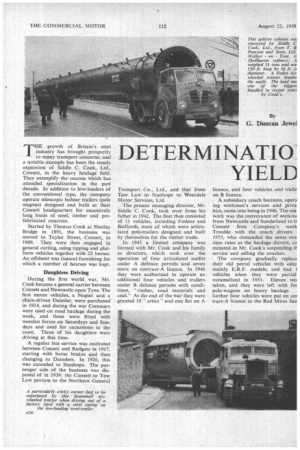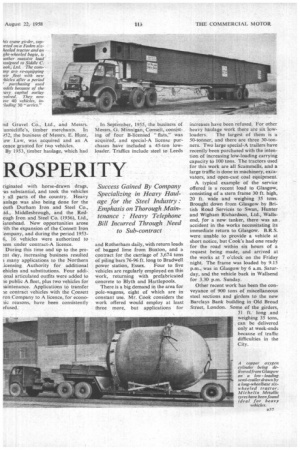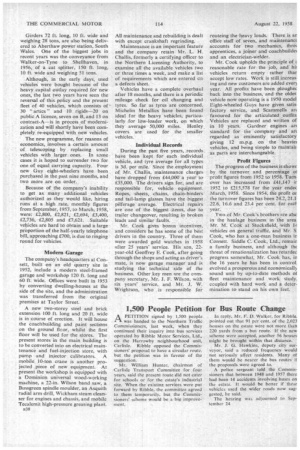DETERMINATIO YIELD ROSPERITY
Page 70

Page 71

Page 72

If you've noticed an error in this article please click here to report it so we can fix it.
By
G. Duncan Jewel
THE growth of Britain's steel industry has brought prosperity . to many transport concerns, and a notable example has been the steady expansion of Siddle C. Cook, Ltd.,
Consett, in the heavy haulage field. They exemplify the success which has attended specialization in the past decade. In addition to low-loaders of the conventional type, the company operate telescopic bolster trailers (pole wagons) designed and built at their Consett headquarters for excessively long loads of steel, timber and prefabricated concrete.
Started by Thomas Cook at Shotley Bridge in 1891, the business was moved to Taylor Street, Consett, in 1909. They were then engaged in general carting, using tipping and platform vehicles together with 22 horses. An offshoot was funeral furnishing for which a number of hearses was kept.
Daughters Driving
During the first world war, Mr.
Cook became a general carrier between Consett and Newcastle upon Tyne. The
first motor vehicles, a Napier and a. chain-driven Daimler, were purchased in 1914, and during the war Commers were used on road haulage during the week, and these were fitted with wooden forms on Saturdays and Sundays and used for excursions to the
coast. Three of his daughters were driving at this time.
A regular bus service was instituted between Consett and Redgate in 1917, starting with horse brakes and then changing to Daimlers. In 1926, this was extended to Stanhope. The passenger side of the business was disposed of in 1939: the Consett to Taw Law portion to the Northern General Transport Co., Ltd., and that from Tow Law to Stanhope to Weardale Motor Services, Ltd.
The present managing director, Mr. Siddle C. Cook, took over from his father in 1942. The fleet then consisted of 11 vehicles, including Fodens and Bedfords, most of which were articulated pole-trailers designed and built by themselves for the timber trade.
In 1945 a limited cOmpany was formed with Mr. Cook and his family as directors, which took over the operation of four articulated outfits under A defence permits and seven more on contract-A licence. In 1946 they were authorized to operate an additional four vehicles and trailers under B defence permits with conditions, " timber, road materials and coal." At the end of the war they were granted 10 " artics " and one flat on A licence, and four vehicles and traile on B licence.
A subsidiary coach business, opera ing workmen's services and priva hire, came into being in 1946. The ma work was the conveyance of worktm from Newcastle and Sunderland to ti Consett Iron Company's work Trouble with the coach .drivers . 1953, who demanded the same ove time rates as the haulage drivers, cu minated in Mr. Cook's suspending tt service and selling the coaches.
The company, gradually replacc their old petrol vehicles with oiler mainly E.R.F. models, and had l vehicles when they were partial nationalized in 1951. Eleven wei taken, and they were left with fat pole-wagons on heavy haulage. further four vehicles were put on cot tract-A licence to the Red Mires San rid Gravel Co., Ltd., and Messrs. unnicliffe's, timber merchants. In ?52, the business of Messrs. E. Hunt, 'ow Law, was acquired and an A cence granted for two vehicles.
By 1953, timber haulage, which had riginated with horse-drawn drags, 'as substantial, and took the vehicles ) all parts of the country. Heavy aulage was also being done for the outh Durham Iron and Steel Co., td., Middlesbrough, and the Redeugh Iron and Steel Co. (1936), Ltd., iateshead. New opportunities arose rith the expansion of the Consett Iron icpmpany, and during the period 19536, 16 vehicles were authorized to tem under contract-A licence.
During this time and up to the premt day, increasing business resulted 1 many applications to the Northern .icensing Authority for additional ehicles and substitutions. Four addianal articulated outfits were added to ie public A fleet, plus two vehicles for taintenance. Applications to transfer le contract vehicles with the consett ron Company to A licence, for econolie reasons, have been consistently efused.
In September, 1955, the business of Messrs. G. Minnigan, Consett, consisting of four B-licensed " flats," was acquired, and special-A license purchases have included a 45-ton lowloader. Traffics include steel. to Leeds and Rotherham daily, with return Toads of bagged lime from Buxton, and a contract for the carriage of 3,674 tons of piling bars 76-96 ft. long to BradweIl power station, Essex. Four to five vehicles are regularly employed on this work, returning with prefabricated concrete to Blyth and Hartlepools.
There is a big demand in the area for pole-wagons, eight of which are in constant use. Mr. Cook considers the work offered would employ at least three more, but applications for loaders. The largest of them is a 50-tonner, and there are three 30-tonners. Two large special-A trailers have recently been purchased with the intention of increasing low-loading carrying capacity to 100 tons. The tractors used for this work are all Scammells, and a large traffic is done in machinery, excavators, and open-cast coal equipment.
A typical example of the service offered is a recent load to Glasgow, consisting of a stern frame 30 ft. high, 20 ft. wide and weighing 35 tons. Brought down from Glasgow. by British Road Services to Swan, Hunter and Wigham Richardson, Ltd., Wallsend, for a new tanker, there was an. accident in the works necessitating its immediate return to Glasgow. B.R.S. were unable to provide a vehicle at short notice, but Cook's had one ready for the road within six hours of a request being made, and arrived at the works at 7 o'clock on the Friday night. The frame was loaded by 9.15 p.m., was in Glasgow by 6 a.m. Saturday, and the vehicle back in Wallsend for 3.30 p.m. Sunday.
Other recent work has been the conveyance of 900 tons of miscellaneous steel sections and girders to the new Barclays Bank building in Old Broad Street, London. Some of the girders, 51 ft. long and weighing 35 tons, can be delivered only at week-ends because of traffic difficulties in the City. THE COMMERCIAL MOTOR Girders 72 ft. long, 10 ft. wide and weighing 28 tons, are also being delivered to Aberthaw power station, South Wales. One of the biggest jobs in recent years was the conveyance from Walker-on-Tyne to Shellhaven, in 1956, of a cat splitter, 150 ft. long, 10 ft. wide and weighing Si tons. Although, in the early days, used vehicles were bought because of the heavy capital outlay required for new ones, the last two years have seen the reversal of this policy and the present fleet of 40 vehicles, which consists of 30 " artics " and 10 rigids-20 on public A licence, seven on B, and 13 on contract-A--is in process of modernization and will shortly haVe been completely re-equipped with new vehicles.
The new programme, for reasons of economics, involves a certain amount of telescoping by replacing small vehicles with larger ones. In some cases it is hoped to surrender two for one of equal carrying capacity. Four new Guy eight-wheelers have been purchased in the past nine months, and two more are on order.
Because of the company's inability to get as many • additional vehicles authorized as• they would like, hiring runs at a high rate, monthly figures from September, 1957; to March, 1958, were £2,800, £2,821, £2,694, £3,400, • £2,736, £2,805 and £7,621. . Suitable vehicles are hard to obtain.and a large proportion of the half-yearly telephone bill, approaching £700, is due to ringing • round for vehicles.
Modern Garage . .
The company's headquarters at Con sett, built on an old quarry 'site in 1952, include a' modern steel-framed garage and workshop 120 ft. long and 60 ft. wide. Offices were built in 1953 by converting dwelling-houses at the side of the site, and the administration was transferred from the original premises at Taylor Street.
A new two-storey steel and brick extension 100 ft. long and 20 ft. wide is in course of erection. It will house the coach building and paint sections on the ground flf.,•or, whilst the first floor will be used for the stores. The present stores in the main building is to be converted into an electrical maintenance and fuel-injection store, with pump and injector calibrators. A mobile 10-ton crane is another projected piece of new equipment. At present the workshop is equipped with a Dominion universal wood-working machine, a 22-in. Wilson band saw, a Bussgreen spindle moulder, an Asquith radial arm drill. Wickham steam cleanser for engines and chassis, and mobile Tecalemit high-pressure greasing plant.
ra38 All maintenance and rebuilding is dealt with except crankshaft regrinding.
Maintenance is an important feature and the company retain Mr. L. H. Challis, formerly a certifying officer to the Northern Licensing Authority, to examine all the available vehicles two or three times a week, and make a list of requirements which are entered en a defects sheet.
Vehicles have a complete overhaul after 18 months, and there is a periodic mileage check for oil changing and lyres. So far as tyres are concerned, Michelin Metallics have been found ideal for the heavy vehicles, particulady for low-loader work, on which they average 50,000 miles. Henley, covers are used for the smaller vehicles.
Individual Records During the past five years, records, have been kept for each individual vehicle, and tyre average for all types is 3d. per mile. Since the emploYment of Mr. Challis, maintenance charges have dropped from £44,000 a year to £.35,000. The drivers sign for, and are responsible for, vehicle equipment. Ropes, sheets, chains, chain-binders and tail-tanip glasses have the biggest pilferage average. Electrical repairs are one of the biggest items, due to trailer changeover, resulting in broken leads and similar faults.
Mr. Cook gives bonus incentives, and considers he has some of the best drivers in the country. Three of them were awarded gold watches in 1958 after 25 years' service. His son, 22year-old Geoffrey E. Cook, after going through the shops and acting as driver's mate, is now garage manager and is studying thefl tedmical side of the business. Other key men are the company secretary, Mr. J. F. Wilson, with six years' service, and Mr. J. W. Wrightson, who is responsible foi
routeing the heavy loads. There is an office staff of seven, and maintenanct accounts for two mechanics, chi-cc apprentices, a joiner and coachbuildei and an electrician-welder.
Mr. Cook upholds the principle of 2 reasonable rate for the job, and hit vehicles return empty rather thar accept low rates. Work is still increas. ing and new customers are added ever} year. All profits have been ploughec back into the business, and the oldes vehicle now operating is a 1950 model Eight-wheeled Guys have given satis. factory service, and Scammells ar( favoured for the articulated outfits Vehicles are replaced and written of in 10 years. Gardner engines art standard for the company and art regarded as eminently satisfactory giving 12 m.p.g. on the heaviei vehicles, and being simple to maintair as parts are interchangeable.
Profit Figures The progress of the business is showr by the turnover, and percentage oi profit figures from 1952 to 1958; Turn• over has increased from £41,147 ir 1952 to £215,578 for the year endec March, 1958. Since 1954, the profit or the turnover figures has been 24/, 21.1 22.6. 16.6 and 23.4 per cent. for cad year. • " Two of Mr. Cook's brothers are atsc in the haulage business in the area Mr. M. Cook at Stocksfield, •With 14 vehicles on general traffic, and Mr. S Cook, who has a one-man business in Consett. Siddle C. Cook, Ltd., remain a family business, and although thE threat of renationalization has retarded progress somewhat, Mr. Cook has, in the 16 years he has been in control, evolved a prosperous and economically sound unit by up-to-date methods of fleet maintenance and work study. coupled with hard work and a determination to stand on his own feet.




















































































































